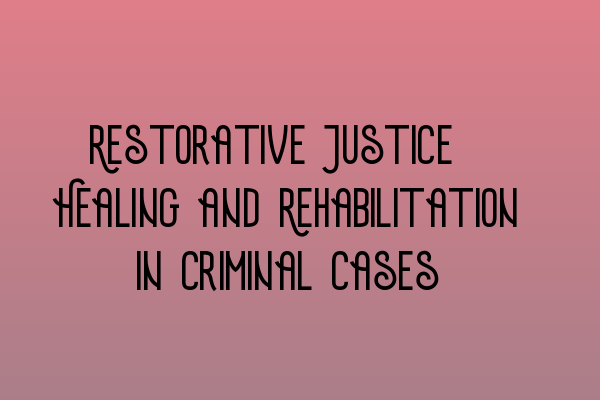Restorative Justice: Healing and Rehabilitation in Criminal Cases
Restorative justice is a unique approach to handling criminal cases that is focused on the healing and rehabilitation of all parties involved. Instead of solely focusing on punishment, restorative justice aims to repair the harm caused by the offense and address the underlying causes that led to the criminal behavior. In this blog post, we will explore the principles of restorative justice and its benefits in criminal cases.
Understanding Restorative Justice
Restorative justice is based on the belief that crime not only affects the victim but also the offender and the community as a whole. It centers around the idea of accountability, empathy, and dialogue. The process involves bringing together the victim, offender, and other affected individuals to discuss the impact of the offense, develop solutions, and promote healing.
Unlike the traditional criminal justice system, restorative justice recognizes the importance of addressing the needs of all parties involved. The victim is given a voice and the opportunity to express their feelings and ask questions to the offender. The offender, on the other hand, is encouraged to take responsibility for their actions, understand the consequences, and make amends.
Restorative justice also emphasizes the involvement of the community. Community members play a crucial role in supporting the healing process and holding both the victim and the offender accountable. This collective approach helps build a sense of trust, understanding, and solidarity within the community.
The Benefits of Restorative Justice
Restorative justice offers numerous benefits over the traditional punitive approach in criminal cases. Let’s explore some of these advantages:
- Victim Empowerment: Restorative justice provides victims with the opportunity to be heard, validated, and actively participate in the resolution process. This empowerment aids in their healing and recovery.
- Offender Accountability: By involving the offender in discussions about the consequences of their actions and encouraging them to make amends, restorative justice promotes accountability and encourages personal growth and rehabilitation.
- Reduced Recidivism: Studies have shown that restorative justice processes can lead to a lower rate of reoffending compared to traditional punishment-oriented approaches. By addressing the root causes of criminal behavior, restorative justice helps offenders reintegrate into society successfully.
- Community Engagement: Restorative justice actively involves the community by fostering dialogue and encouraging community members to participate in the resolution process. This engagement helps to strengthen community bonds and prevent further crime.
Implementing Restorative Justice
Restorative justice can take various forms, depending on the nature of the offense and the needs of the individuals involved. Some common restorative justice practices include victim-offender mediation, family group conferences, and circle sentencing.
To successfully implement restorative justice, it is vital to have trained professionals who can facilitate the dialogue and ensure a safe and respectful environment. These professionals, such as restorative justice practitioners and mediators, play a crucial role in guiding the process and helping participants communicate effectively.
As legal professionals, it is important for solicitors and practitioners to be familiar with restorative justice principles and practices. By incorporating restorative justice into their work, they can ensure that their clients receive the support and guidance needed for healing and rehabilitation.
At SQE Criminal Law & Practice Law UK, we recognize the importance of restorative justice and its potential to transform the criminal justice system. We offer comprehensive SQE preparation courses where aspiring solicitors can learn about restorative justice, along with other essential legal topics.
To learn more about our SQE preparation courses, visit our related articles:
- SQE 1 Practice Exam Questions
- SQE 1 Practice Mocks FLK1 FLK2
- SQE 2 Preparation Courses
- SQE 1 Preparation Courses
- SRA SQE Exam Dates
By choosing SQE Criminal Law & Practice Law UK for your SQE preparation, you will gain the necessary knowledge and skills to excel in your legal career and make a positive impact on the criminal justice system.
Restorative justice offers a powerful and compassionate approach to criminal cases, prioritizing healing and rehabilitation. By embracing this approach, we can aim for a justice system that not only punishes but also nurtures growth and positive change.
